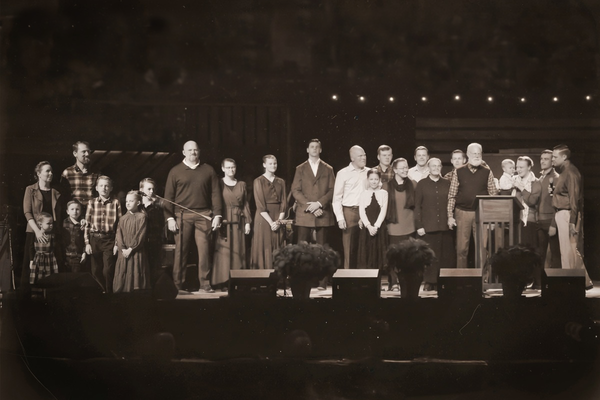Turning the Hearts of Fathers
When fatherhood falls, culture collapses. We don’t need perfect dads—we need present ones, submitted to God, passing on patterns shaped by love, not control. The future won’t be saved by policy, but by fathers who remember how to be sons.

I’ve received more responses to this talk than just about anything I’ve recently shared.
Maybe it’s because we’re all starting to see the fallout.
Maybe it’s because so many are waking up to the silent collapse that’s been unraveling—not at the ballot box, but in living rooms, around dinner tables, and in fatherless homes.
At last month’s Homestead Conference, I spoke on “Turning the Hearts of Fathers: Restoring Generational Connection in a Fatherless Age.”
It wasn’t a sentimental appeal. It was a call to revolution—one that begins with fathers, patterns, decisions, and the courage to rebuild what’s been lost.
If you missed it, I want to share the full transcript with you. It’s not just for dads. It’s for anyone who sees the cracks in our culture and still believes God can raise up something whole from what’s been broken.
Read it. Share it. Wrestle with it.
Because if the kingdom is going to move forward, it will begin—again—with fathers.
Restoring Generational Connection in a Fatherless Age
Transcript from Homestead Conference 2025
1. The Culture War You Didn’t See Coming
Good morning, everybody.
Before I begin, I want to mention that what I’m going to share today is explored more deeply in two books that I’ve written. The first is called Freedom Is Killing Our Liberty. You can find it on Amazon. The core thesis is simple: the American experiment of limited, constitutional government was never meant to function apart from a robust, moral culture rooted in faith. This book tells the story through our own journey to intentional Christian community.
The second book is called Child Training. It’s a condensed distillation of teachings I’ve given on parenting and fatherhood in our community over the years. That, too, is available online. Both books connect to what we’re talking about today.
Now, what does any of this have to do with a homesteading conference?
It has everything to do with it.
Because homesteading is not just about self-sufficiency—it’s about culture. And culture always coheres around authority. The question is not whether authority exists, but which kind of authority defines our lives.
And at the heart of God’s kingdom is not a democracy. It’s not a dictatorship. It’s not even a monarchy in the conventional sense. It’s a fatherhood.
Jesus made that unmistakably clear when He taught us how to pray:
“Our Father, Who art in heaven, hallowed be Your name. Thy kingdom come” (Matt. 6:9-10).
The kingdom does not come by coercion. It comes by relationship—a relationship of care, of responsibility, of truth expressed through love. And that, Biblically, is called fatherhood.
So if you’re here to learn about building culture—about passing on peace, order, and meaning to your children—then we must begin where God began: with fathers.
2. When Fatherhood Falls
The reason we know that fatherhood is central to God’s design is because of how viciously it has been attacked.
You remove fathers, and what’s left to fill the void is Caesar’s kind of authority—impersonal, imposed, and transactional. Not all authority is wrong, but when fatherhood collapses, State coercion becomes the only authority we have left. And our culture has been steadily replacing relational authority with impersonal control.
Let’s name just a few ways fatherhood is under assault:
Education
Modern education has displaced fathers as the primary authority in a child’s moral and intellectual formation. In today’s classroom, science is exalted as ultimate truth, while the Bible is reduced to outdated moral history. Fathers have been painted as backward. Faith as foolish. And authority—especially relational authority—is mocked.
Economy
The very word “economy” comes from the Greek oikonomia—the order of a household. It used to describe how a family organized itself for stewardship, provision, and purpose. But today, economy means labor extracted away from the home. Fathers are pulled from their homes to earn a wage. In their absence, the home slowly disintegrates. Children are taught by strangers. Meals are outsourced. Entertainment seeps in, and with it, the slow erosion of connection, peace, and fatherly influence.
Entertainment
If you’ve spent even a little time in pop culture, you’ve seen how fathers are portrayed: clueless, irrelevant, emotionally absent, and usually the punchline of the joke. That narrative, repeated over and over, makes fatherhood look silly at best and harmful at worst.
These aren’t just cultural trends. They are tectonic shifts in the architecture of society. And the results?
- 85% of youth in prison are from fatherless homes.
- 90% of homeless children come from fatherless homes.
- 75% of drug-addicted teens needing professional help? Fatherless homes.
Fatherhood isn’t a cultural ornament. It’s God’s chosen order of peace and order in this world.
3. God’s Revolution Started with a Father
God’s salvation plan didn’t begin last year—or even in the New Testament. He started long ago. But the first major turnaround attempt in human history? It didn’t quite land. That first restart was Noah. And while Noah preserved the human race from extinction, he didn’t preserve the relationships that God wanted. He saved the world—but failed to disciple his sons. Survival without transformation.
So God tried again—with Abraham. And that was different.
Abraham is the beginning of the faith you and I now walk in. The Apostle Paul, speaking to Christians, calls Abraham “our father.” Jews call Abraham their father. Muslims trace their lineage to Abraham. Altogether, more than half the people on this planet look to Abraham as their spiritual patriarch.
That wasn’t just a revival. That was a revolution.
And how did God launch it?
Did He raise up an army?
Did He broadcast a message on a global network?
Did He release a manifesto or rally a crowd?
No. He taught one man how to be a father.
That’s how the revolution began: not with mass media, not with military might—but with a man learning how to pass on new patterns, new values, new decisions. Abraham walked away from the collapsed patterns of Mesopotamian culture—a debauched society where even children were expendable—and he walked toward a new vision. A fatherhood-shaped vision.
He didn’t just believe differently. He lived differently. And through that, a new culture was born.
God’s revolution began in a tent, not a throne room—in a father’s heart, not a palace war council. That’s how much God values fatherhood.
So if we want to talk about restoring the culture, if we want to talk about lasting change that outlives us, we’d better start exactly where God started: by recovering fathers.
4. The Pattern and the Power
Jesus gave us the key:
“The Son can do nothing by Himself; He can do only what He sees His Father doing” (John 5:19).
That’s not just a theological truth about the Son of God and His Father. That’s a human reality.
Kids do what they see.
Children learn best not what parents say most, or wish most—but what parents do most.
That’s why fatherhood matters so much. It’s the delivery system for God's patterns. Without it, the culture collapses into a formless void of theories and slogans, but no living example. No pattern to follow. No decisions modeled in love.
We think we’re raising sons and daughters with information. But if they’re not connected to what we do, they’ll never be able to carry what we believe.
And that brings us to one of the great lies of our day: radical individualism.
This is the myth that every man is an island unto himself, self-made and self-contained. It sounds noble. It feels empowering. But it’s a lie.
Yes, there’s a place for personal responsibility. Yes, I affirm that the individual matters. In fact, the word private in its original usage meant “not of the State.” So I love the concept of a free, independent man made in the image of God.
But radical individualism—the idea that I can do it alone, that I don’t need anyone else, that I can father without being fathered—that is an illusion.
Even Jesus said: “By Myself, I can do nothing.”
So if we’re going to restore fatherhood, we have to start by rejecting the lie of autonomy. We have to replant ourselves in sonship—to live as men under authority before we try to live honorably in authority.
5. True Authority Comes from Submission
We all remember the Roman centurion who came to Jesus and said, “Just speak the word, and my servant will be healed.”
It was an astounding moment. This man had power. He had soldiers under his command. But listen to what he said:
“I also am a man under authority. And I say to one, ‘Go,’ and he goes.”
Not, “I’m in authority.”
But, “I’m under authority.”
And Jesus marveled at him. He said, “I’ve not found faith like this—not in all Israel” (Matt. 8:8-10).
Why? Because the centurion understood something fundamental: true authority is always derived. It comes from submission. The only reason his orders carried power was because he was connected to a greater command.
That’s what godly fatherhood looks like. Not domination. Not control. Not, “I’m the boss, so listen to me.”
It looks like this: “I’m under God. I’m following Him. And I invite you to follow me as I follow Him.”
Paul said it plainly,
“Follow me, as I follow” (1 Cor. 11:1).
If I were to correct one of my teenagers, I would ask them, “Is that how Daddy would speak to Granddaddy? Is that how I would talk to Brother Howard or Brother Joel?”
And my kids know—absolutely not. I wouldn’t.
So they see: I’m not asking them to submit to me because I’m stronger, or older, or louder. I’m asking them to submit because I, too, am submitted.
I’m a son before I’m a father.
That’s the only kind of fatherhood that carries spiritual authority. Not autonomous, not isolated—derivative. It flows from the Father above.
6. Pattern-Givers and Decision-Makers
The word father comes from two linguistic roots.
In Latin, it’s pater, which means “pattern.”
In Hebrew and Aramaic, it’s abba or abu, which means “decision-maker.”
So at its etymological core, fatherhood suggests:
“A pattern-giver and a decision-maker.”
But let’s be honest: what derails most fathers?
Indecision. Inconsistency. Hesitation.
When I start failing as a father, it’s because I can’t decide—or because my pattern is broken, unclear, or hypocritical.
So where does good decision-making come from?
Perfect decisions require perfect knowledge. If I could see around corners . . . . If I knew the future . . . . If I had the ability to forecast outcomes with flawless insight—I could make perfect calls. But I’m not omniscient. I’m not God.
And that’s where many men get paralyzed. They freeze. They fear making the wrong move. They call it caution, but it’s really unbelief in disguise.
But here’s the good news: faith opens the door to wise decisions, even without perfect knowledge.
If I have a relationship with the God who does know the end from the beginning, and I seek Him in faith, then He can reveal to me not just principles—but decisions. His Spirit can guide me in the particulars of real life.
And if I’m walking by faith—not just analyzing, not just strategizing—then even when I fail, I fall forward. Even my mistakes become wisdom.
Because my kids don’t just see what I decided. They see why I decided. They hear me say, “Kids, I thought this was right. I really sought the Lord. And I was wrong. Please forgive me.”
And guess what? That doesn’t lower their respect—it raises it. Because now they know: Dad’s not flying blind or throwing his weight around. He’s in submission himself—trying to learn what pleases the Lord.
Even Paul said it:
“Try to learn what pleases the Lord” (Eph. 5:10).
And in Acts 16, we see it in real time. Paul is trying to go to Bithynia. The Spirit says no. So he pivots—tries Asia. Again, the Spirit says no. Finally, he sees a vision of a man from Macedonia calling for help. He follows the vision—and ends up in jail.
But even there, Paul sings.
He doesn’t crumble in failure. Because when your authority is rooted in faith, not pride, your mistakes become testimony. The jailer gets saved. The lesson lives on.
7. Authority Rooted in Faith, Not Ego
If your parenting is rooted in faith—God will meet you.
He’ll stop you at the gates. He’ll reroute your steps. He’ll correct your course.
But if it’s rooted in ego, control, fear—you’re going to crush your kids or crash your own soul.
Whatever is not of faith is sin. And faith comes by hearing the Word of God.
So what’s our message to our kids?
“Be patient with us. We're still learning how to hear God. We're trying. We're listening.”
One of my brothers-in-law tells the story of sitting down at thirteen years old with his parents. They said, “Son, we’ve made some mistakes. We’d like to do some things differently.”
And instead of losing respect for them, he gained it.
He saw: my parents are learning, too. They’re submitted. They’re not pretending perfection—they’re walking in humility.
That’s what earns trust.
Fathers, don’t be afraid to be wrong. Don’t be afraid to apologize. Don’t be afraid to learn. Be afraid of rooting your authority in yourself.
Because your strength has an expiration date. But Christ—Christ is the same yesterday, today, and forever. Root your fatherhood in Him—and even your stumbles will become stories of grace.
8. Reclaiming the Joy of Fatherhood
We’ve got to get back the joy.
The Apostle Paul wrote of our time, saying that people would lose “natural affection.” And isn’t that what we’ve seen? So many fathers no longer enjoy their children.
But joy is not a luxury. It’s not a bonus feature in parenting. It’s the lifeblood of fatherhood.
A dad should delight in his children.
That should be normal. That should be expected. And most dads do, when their kids are small—when they’re cute, innocent, eager to please. But what happens when that child grows up and starts to show willfulness, defiance, laziness, or disrespect?
Suddenly, the delight dries up.
And too often, it’s because we’re seeing a reflection of our own neglect—our inconsistency, our lack of discipline, our absence. So we avoid the child. We avoid the interactions. We start to avert our eyes, like we do with the junk drawer in the kitchen or the weedy corner of the yard.
We stop enjoying them, because we didn’t invest in them.
But here’s the truth: you can train a child. You can. And if you do, they will become enjoyable again. It may take a week. It may take a month. But if you’re consistent, if you’re faithful, if you decide, “This behavior is not acceptable, and I’m going to deal with it lovingly, consistently, and completely”—you will reclaim your home. And your child.
You don’t need magic. You don’t need tricks. You don’t need shortcuts.
You need commitment.
You need to see that parenting is not an interruption of your real life. It is your real life. It’s the most important thing happening today. More important than your job. More important than your to-do list. More important than the news or the market or your reputation.
Right now, in homes all over the world, pastors are being formed. Wise men are being shaped. Moses, John the Baptists, Esthers—are learning what’s true from the daily patterns of their parents.
You are not managing a problem. You are shaping the future of the kingdom of God.
And that is not a burden. That’s an honor.
9. Training, Not Just Teaching
Now, don’t confuse teaching with training.
Teaching is explaining what’s right.
Training is correcting what’s wrong.
Teaching is theory.
Training is practice.
We must do both. But many parents stop at, “I told him not to do that.” Telling is not enough. You have to train. That means consequences. That means consistency. That means walking through the hard moments until the new pattern is not only understood but lived.
And then—joy returns.
Your children become a pleasure to be with again. They respond. They engage. They laugh with you. And that joy becomes the soil in which everything else grows.
You’ll find yourself not just tolerating them, but seeking them out. Wanting them on the walk. Wanting them in the truck. Wanting them at the fishing hole—even if you spend the whole day untangling their lures.
Because now, they’re a delight.
And that’s how it should be.
10. Affection Is Not Optional
We must also recover affection.
Being a father is not just about being stern. It’s about being tender. It’s about laughing. Telling stories around the dinner table. Playing bear in the hallway. Wrestling, tickling, hugging.
Affection isn’t sentimental fluff. It’s essential.
God says, “I will carry you on My hip” (Isa. 66:12).
Isaiah says God will bounce His children on His knees (Isa. 66:12).
Paul says, “Be kindly affectionate to one another with brotherly love” (Rom. 12:10).
And Jesus—every time His Father spoke from heaven, He didn’t give doctrine. He gave affection:
“That’s My Son. I love Him. And I’m pleased with Him” (Matt. 3:17).
That’s what sons and daughters need.
We must say to our sons: “You’re my boy. Come here. I love you—not for what you do, but because you’re mine.”
Yes, there is approval that’s earned. But there is also acceptance that is not. There is delight that’s not tied to performance.
And if you grew up in a dry, stoic, maybe Germanic or emotionally constipated religious culture that told you affection is weakness? Repent of that.
That’s not biblical. That’s not Christian. And it’s not Jesus.
We’re not just giving agape—sacrificial love. We’re giving phileo—brotherly love. Affection. Warmth. Joy.
Because if your home is full of laughter, delight, trust, and connection—then when discipline comes, your kids won’t confuse it. They’ll know it’s love. It will feel like what it’s supposed to feel like: a break in the music. A missing piece of joy they want to restore.
Without affection, discipline breeds resentment.
With affection, discipline feels like love.
11. Humility Is the Heart of Authority
Love takes humility. That’s not optional.
It’s hard to tell someone you love them when your sense of authority is based on being “bigger” or “stronger.” So if you struggle to show affection, it’s not just an emotional limitation—it’s a sign that your authority is rooted in the wrong thing.
You’re afraid that if you show softness, you’ll lose traction. But that begs the deeper question:
What exactly are you leading in?
Are you leading toward compliance? Toward performance? Toward image?
Or are you leading toward love?
True leadership is not invincibility. It’s not image management. It’s not intimidation.
If you’re a sheriff, maybe you can’t be vulnerable. If you’re a politician, maybe you can’t admit failure. If you’re surrounded by wolves in Congress, maybe you can’t let your guard down.
But you’re not running Congress. You’re running a household.
You’re raising children.
You’re not leading toward dominance—you’re leading toward fruitfulness and trust.
The King of kings was stripped naked, mocked, and nailed to a cross—and He was still leading.
So yes, you can cry.
Yes, you can admit you were wrong.
Yes, you can apologize to your children.
Yes, you can be vulnerable—and still be their father.
In fact, that’s when you’re most their father.
That’s when you’re modeling what it means to trust God—not your strength, not your ego, not your image. That’s when you’re pointing them to a Father who perfects His power in us through our weakness.
12. Behavior Management versus Relationship Cultivation
We’re not managing for behavior. That’s what you do with animals.
We’re cultivating relationship.
You can raise a polite child who is manipulative and deceitful. You can enforce good manners without ever reaching the heart. And if that’s your goal—just good behavior—you’ll raise Pharisees. Hypocrites. Whitewashed tombs.
But if you parent for relationship, you’ll raise sons and daughters who know love, who trust authority, who become faithful and free.
So ask yourself: Am I cultivating how my child feels about me, about others, about God? Because if your child obeys but resents you . . . if they comply, but their heart is closed . . . if they say “yes sir” while simmering with rebellion—you’ve won behavior but lost the soul.
We want more than compliance. We want connection. We’re not managing for outcomes. We’re raising people for the kingdom of God. And that starts with relationship.
13. Breaking the Cycle
Now someone may ask—what do I do if I never had a godly father?
What if my dad was absent? What if he was angry, abusive, cold, manipulative, or just never present?
What then?
Let me tell you a story.
When I think of the word father, one of the first images that comes to mind is waking up in the dark, before the sun had risen, and realizing someone was sitting on my bed.
It was my dad.
He said, “Son, if I spoke too harshly to you last night, would you please forgive me? I want you to know I love you. And I respect you.”
That was fatherhood. Not perfect behavior. Not image management. But love, humility, and accountability. Never selfish. Never vindictive. Never angry just to be angry.
He could be firm—I saw him look an eighteen-year-old in the eyes and say, “If you’re not going to live by this family’s patterns, you’ll need to pack your bags and go elsewhere.” But he said it with tears in his eyes. It hurt him more than it hurt the young man.
That’s fatherhood.
Consequence and love.
Correction and acceptance.
Saying no to everything wrong in us while saying yes to everything right—even if that right is barely visible.
But how did my dad get there?
Because his father—my grandfather—killed himself. He was a pitiful example of a father. And his grandfather—my great-grandfather—abandoned the family, came back five years later, and died of tuberculosis.
On both sides of my family, fatherhood was broken. Shattered.
But the curse didn’t win.
Because my dad met and received the Father to the fatherless—Who vowed to never leave or forsake us as orphans. He went from an atheist to an evangelist as soon as his understanding of God was not merely theoretical but experiential—a lasting relationship of love with the God Who is love, once unknown to him but now profoundly real. And I remember, decades later, when we were growing up, my dad standing in front of our family and saying, “The generational curse stops with me. Love is going to win. Faithfulness, mercy, and life are going to triumph with us.”
So don’t believe for a moment that your past determines your future.
Don’t accept any narrative that makes your father’s sins your calling.
If that were so, I wouldn't be standing here right now. I am living evidence, as are my six children and my mother’s sixty+ grandchildren, that the cycle can be broken—and a new cycle of life and fruit, started by my father, can continue with as much persistence as the generations of failure before.
There is grace. There is power. There is a Father in heaven who rewrites stories, who breaks cycles, who rebuilds families from rubble. And He’ll do it for you.
The Lord promises, “I will restore to you the years that the locust has eaten” (Joel 2:25).
You serve a God who has sworn to give you “beauty for ashes, the oil of joy for mourning, the garment of praise for the spirit of heaviness” (Isa. 61:3).
It starts in the heart. It starts with trust. And it grows in a family of families—the church.
14. The Real Generation
We talk about “generational cycles,” and we should. But ultimately, the problem with society is not just upbringing—it’s the human heart.
Even the perfect environment—Eden—couldn’t override the will of the heart.
Perfect garden. Perfect mate. Perfect Parent—God Himself.
Still failed. Why?
Because change doesn’t start with setting. It starts with grace.
You can’t just engineer your way out of sin. You can’t parent your way into paradise. You can’t homestead hard enough to regenerate the heart. That takes a miracle. That takes God.
So yes, once grace transforms a heart, we need culture to support that transformation. We need households, traditions, and patterns that nurture the seed. But we must never confuse culture for conversion. We need both. But grace must come first.
When my dad gave his life to Jesus, that was the real beginning.
That was the generation that mattered most. The regeneration.
And from that moment on, he lived to pass that flame. Not only the faith—but the patterns. The love. The submission. The correction. The joy.
He was happy to admit his missteps: “We did this wrong. So do it differently.”
He handed us more than principles. He handed us himself. That’s what godly fatherhood looks like.
15. Grafted into the Line of the Faithful
Jesus said, “This generation will not pass away until the Son of Man returns.”
And I believe He wasn’t just talking about an age or a time period. He was talking about a people—a generation within every generation. A generation of the faithful. A generation of sons and daughters who know their Father.
You can be grafted into that.
You can enter the generation of the Spirit, of the kingdom, of the Father and His sons. It’s not too late. You can be a son. You can become a father. You can leave behind you the legacy of living and growing by the second birth.
Psalm 78 says:
“We will not hide His works from our children, but tell them to the coming generation—the glorious deeds of the Lord” (Ps. 78:4).
So tell them.
Live them.
Show them.
And when your children ask, “Who is our Father?”—they won’t have to guess.
They’ll see Him in you.
16. A Poem for the Fatherless Age
I want to end with a poem I wrote years ago—not for any individual dad, but for the role of fatherhood in our minds, our families, and our culture.
This is about the death of fatherhood in society—and the call to rise again.
“Show Me the One Whose Father Has Died”
by Asahel Adams
Show me the man for whom things have grown commonplace,
The one who’s lost the fervor and the grace,
Whose aspirations never reach to touch or try—
And I will show you the one whose father has died.
Show me the man who cannot change his ways,
Give up conceit, let go of sin, though death it pays,
Who cannot become more humble, more gentle or kind—
And I will show you the one whose father has died.
Show me a heart that never pounds inside,
That never blanches or blushes at its own pride,
For whom all life becomes a scoff and a sigh—
And I will show you a man whose father has died.
Our fathers show us who we are and what we want to be.
For them we strive. For them we achieve.
They call us upward when all else would drag us down—
They lay the cornerstone on which we build our crown.
When fatherhood dies, the world grows old.
Dreams wither. Hearts grow weak and cold.
But where fathers live and call us higher—
The embers of hope can still catch fire.
So rise, O man, and hear the father’s cry:
To live, to love, to labor, and to die—
Not for the fading praises of the earth,
But to leave behind the seed of a second birth.
May God bless all of you—fathers, mothers and children—all of us seeking to realize the will and life and love and joy of our great and merciful and patient Father in heaven.





